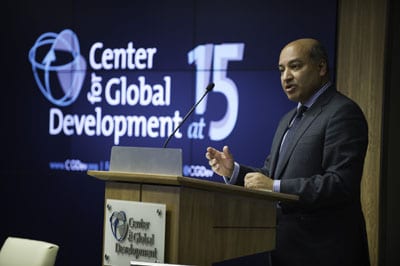Serbia is very important to the EBRD and to me, as President. I believe it is one of our benchmark relationships. Provided that reforms continue, I believe there is potential to increase EBRD investments in Serbia and to make it one of our top five investment destinations
There is a clear reform momentum across the region, which the EBRD will continue to support, says EBRD President Sir Suma Chakrabarti, who is a true supporter of the Western Balkans (WB) future in the EU. We spoke with him on the occasion of his visit to the countries of the region.
In the interview, we covered the reform prospects of the WB, its EU future and the bonding role of the EBRD in uniting positive economic forces at the level of governments and large infrastructural projects, as well as at the level of small and medium-sized enterprises. “EU approximation is a strong reform anchor across the region, especially in Serbia, which has a relatively large and developed economy,” says Mr Chakrabarti.
He also notes the important role of China, which has emerged as an increasingly important trade and investment partner for Southeast Europe and a major sponsor of flagship transport and energy projects in the region, one of the key focuses of the EBRD.
Considering that the EU countries have just started a new round of talks about the Union’s future, we first discussed the EU’s economic prospects after Brexit.
What do you see as the EU’s major economic challenges following Brexit? Were the negative ramifications for both the EU and the UK exaggerated, or it is still too early to assess them properly?
We are at a very early stage of assessing the possible effects. We still do not know when the UK will exit the European Union, and we do not know the economic effects it may have on EBRD countries of operation. So far, we have not noticed any pronounced effects of the UK referendum on our region. Our initial assessment is that countries, where the EBRD invests, will be affected indirectly, should EU growth slow down.
If we add the sluggish recovery, terrorist threats and the ongoing migrant crisis, how do you see the mid-term growth prospects of the EU?
Indeed, the EU economic recovery is relatively slow. GDP across the EU is now, on average, just three per cent above the pre-crisis level, whereas GDP in the U.S. is 10 per cent higher than before the crisis.

Mid-term growth depends on many factors, including some mentioned by you, but they don’t have to necessarily stunt growth.
The EBRD response to the refugee crisis focuses on building the economic resilience and sustainability of host and refugee communities alike – for example, we support Turkey’s plans to give migrants working permits, which would both enable them to make a living and give a boost to industries like manufacturing.
Most EU countries are still burdened with large public debt, bank lending is still low, while levels of non-performing loans (NPLs) are high. But as issues such as NPLs and other structural issues continue to be resolved, growth should pick up.
How is the EU performing on its weakest peripheries, in Greece and Cyprus, where the EBRD is currently involved?
We are now working in Greece and Cyprus on a temporary basis with our mandate to invest ending in 2020. The Economic Adjustment Programme in Cyprus can be considered a success story – Cyprus exited the programme in March this year, two months ahead of schedule, and the economy is growing again.
The EBRD is contributing to Cyprus’s recovery through our investments in the financial and corporate sectors and our support for privatisation and private sector involvement in the infrastructure and energy sectors. We will also be hosting our Annual Meeting in Cyprus in May 2017.
In order to avoid “catching a cold when the EU sneezes”, the Western Balkans must have resilient, diversified economies which are integrated within the region, as well as with the EU, and opening up to other trade partners, like China
The situation is obviously more difficult in Greece, but the authorities have made significant efforts to stabilise the economy and advance with reforms, and we are supporting them strongly through policy dialogue and through our investments, including in the banking sector.
We have already signed 10 projects in less than a year and only recently (on 12th September) arranged a huge €339 million syndicated loan for the acquisition of bonds issued by Greek telecommunications company OTE. While €150 million came from our own funds, the remaining €189 million was syndicated among international and local banks and funds. The transaction sent a strong signal of confidence to the market.
In Greece and Cyprus – as everywhere else really, including the Balkans – we believe there is a lot of economic potentials, although a lot of work is clearly needed.
Considering that the prospects of Western Balkan countries are very much dependent on the economies of the EU, how much do the Western Balkans “catch a cold” today when the EU sneezes?
First of all, I would like to make clear that trade and economic cooperation with the European Union, and especially the EU approximation process, are extremely beneficial to the Western Balkans. Again, it is important to look at the bigger picture. EU approximation is a strong reform anchor across the region, especially in Serbia, which has a relatively large and developed economy.

Hopefully, as the business climate further improves as a result of these reforms, the investment will also grow. These countries are already very connected to the EU market in many ways (including through FDI, trade and labour and remittance flows), though to a lesser degree than Central and Eastern Europe (CEE), a region that is much more integrated into EU value chains.
Let me give you some numbers – while exports to the EU represent 24 per cent of GDP in CEE, it is 13 per cent for Southeast Europe. FDI links, however, are stronger in Southeast Europe, with FDI stock from the EU reaching 57 per cent of GDP (against just 38 per cent in CEE). But CEE has overall higher standards of living and more investment.
In order to avoid “catching a cold when the EU sneezes”, the Western Balkans must have resilient, diversified economies which are integrated within the region as well as with the EU, and opening up to other trade partners, like China.
In a speech I gave in Belgrade during my recent visit, I stressed that only openness and cooperation can bring growth and increase incomes in the Western Balkans and other regions. Those who want to build walls between neighbours and partners are not acting in the economic interest of the people.
Promoting cross-border integration is a vital part of the EBRD’s strategy throughout the region. That is why we are supporting, with our partners, a number of major transport and energy projects in the Western Balkans
The FT recently published your column in which you passionately advocate the EU future of the Western Balkans. Are you a lone supporter of further EU expansion, or do the ideas set down in Thessaloniki, and later through the Berlin Initiative, have more true promoters?
There are many true promoters of the Western Balkans’ EU future, and most importantly that is the EU and the Western Balkans countries themselves. All six countries have formal contractual arrangements with the EU through Stabilisation and Association Agreements. All six have leaderships that believe in regional integration and a European future for their countries.
The EBRD cooperates closely with the European Union, promoting reform and investment. As President of the EBRD, I am indeed a passionate supporter of dialogue in the format of our Western Balkans Investment Forum, bringing together the Western Balkans’ six prime ministers, which was launched at our Headquarters in London in 2014 and soon started bearing real fruit, including through the Berlin process.
We held another successful Western Balkans Investment Forum in February this year. EU approximation and associated reform is a subject that is minutely discussed by prime ministers and other delegates at these forums.
As you mentioned, GDP per capita in the Western Balkans is half that of eastern EU countries, a third that of southern EU members and a mere quarter of the richest EU members in Western Europe. What appeal can the WB region have for the EU?
We and other investors view the region as an increasingly attractive destination for FDI. Serbia, for example, (under the IMF stand-by arrangement) has taken large steps ahead in consolidating its public finances, including the right-sizing of the public administration, restructuring and privatising state-owned companies and improving the business environment.

These are the policies that make a country or region attractive for investors, together with the availability of an educated labour force and good market access. Labour productivity is also quite high and comparable to central and eastern Europe.
Western Balkan countries, of course, should think ahead and improve their economies’ competitiveness. They should continue with prudent fiscal policies and improvements in the business environment.
How much vigour for reforms and the EU accession path are you seeing in the WB countries that you have been visiting these days?
There is clear reform momentum across the region, which the EBRD will continue to support. Evidence of this is the progress Montenegro and Serbia are making in negotiating chapters of the acquis, but also the progress on the reform agenda in Bosnia-Herzegovina, the judiciary reform in Albania and the EU Stabilisation and Association Agreement entering into force for Kosovo.
Serious challenges remain, and we are keen to work with the countries in meeting these challenges and overcoming obstacles to reform. These are twofold – on the one hand, infrastructure questions like the connectivity of transport and energy networks; on the other hand, questions of the business environment like the efficiency of judicial systems, speed of the administration, complexity of regulations and many similar issues.
A successful privatisation of Komercijalna banka and further deep reform within energy provider EPS and Serbia Gas would be seen as important positive signals for investors
The EBRD helped thousands of small and medium-sized enterprises in WB-6 with finance and business advice. Is the reform progress visible at the level of these small engines for growth?
There are indeed signs of improvements in the business environment for small and medium-sized enterprises (SMEs). This is also evidenced by the progress that most countries show in the World Bank “Doing Business” surveys. Generally, obtaining permits seems to be getting easier in many countries while serious issues remain in the area of the rule of law. SMEs are a priority for us, and we have indeed worked with thousands of them – and sometimes a small project takes more time and effort than a massive investment. But in order to succeed they also must become more competitive.
What could the cross-border integration that the EBRD supports bring to the WB countries?
Promoting cross-border integration is a vital part of the EBRD’s strategy throughout this region. That is why we are supporting, with our partners, a number of major transport and energy projects in the Western Balkans. The aim is to bring the quality of cross-border links up to the standards of Western Europe. This will take time, but it will bring long-term benefits in terms of enhancing cross-border trade and bringing further FDI to the region.
Large infrastructure projects are seen as a new but quite expensive glue to bind the Balkan countries. How can these expensive advancements pay off if there is little that WB countries may exchange among themselves when it comes to goods and services?
The main focus of large transport infrastructure investments is to create a “core network” of transport links that connect the countries within the region and the region itself with the surrounding EU countries. It also helps to connect parts of the same country, especially where challenging geography means that it is difficult to travel from one part of the country to another. Bosnia-Herzegovina is an example of this. Therefore, it is not just the movement of goods between the countries of the region that benefits from these kinds of investments.
Some of the countries in the region, both in CEE and SEE (Serbia among them), see China as a distant but appealing partner. How does the EBRD, which recently accepted China among its shareholders, sees this move?
China is an increasingly important trade and investment partner for Southeast Europe, and a major sponsor of flagship transport and energy projects in the region. China became an EBRD shareholder (but not a country where we invest) in January this year, and we see Chinese investments as a welcome complement to other sources of funding for major infrastructure projects, including the “Belt and Road” Initiative.
I believe there is potential to increase EBRD investment in Serbia and to make it one of our top five investment destinations
In May this year, the EBRD and the Central European Initiative hosted a major conference in Trieste on the “Belt and Road” Initiative, with a focus on SEE. You can read some EBRD analysis of this matter on our website.
What is your message for Serbia, now that it has a new government?
During my visit in early September, I met with Prime Minister Vučić and several key members of his cabinet, including the ministers of transport, finance, energy, economy, public administration, agriculture and EU integration, as well as the Mayor of Belgrade, which is the EBRD’s largest municipal client in the region. With the Prime Minister, we discussed Serbia’s economic progress and the EBRD’s support for the Serbian economy through investments and policy dialogue, and also regional and European integration.
We also discussed specific steps, such as potential donor funds from the Serbian Government to expand our work with SMEs. I also stressed that successful privatisation of Komercijalna banka and further deep reform within energy provider EPS and Serbia Gas would be seen as important positive signals for investors. We agreed to speed up the implementation of projects that have already been agreed and went through some other specific topics.
So, we are in constant dialogue with Serbia, its government and our partners. This was my fourth visit to Serbia. The country is very important to the EBRD and to me as President. I believe it is one of our benchmark relationships. Provided that reforms continue, I believe there is potential to increase EBRD investment in Serbia and to make it one of our top five investment destinations.